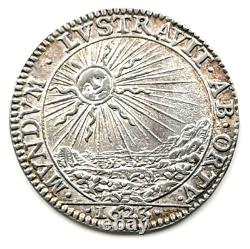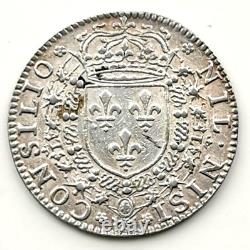
- Home
- Character
- Ceres (12)
- Charles Vi (3)
- Charles X (8)
- Danseuse (3)
- Guiraud (6)
- Henri Iii (4)
- Henry Iii (8)
- Henry Iv (5)
- Hercules (10)
- Louis Xiii (9)
- Louis Xiv (55)
- Louis Xv (51)
- Louis Xvi (39)
- Louis Xviii (13)
- Louis-philippe (20)
- Marianne (6)
- Napoleon (47)
- Napoleon Iii (13)
- Sower (10)
- Victor Hugo (4)
- Other (4111)
- Face Value
- Metal
- Period
- 1795 - 1900 (65)
- 17th Century (3)
- 18th Century (2)
- 1901 - 1999 (45)
- 1930s (2)
- 1940s (3)
- 1950s (2)
- 19th Century (2)
- After 2000 (9)
- Before 1900 (2)
- Feudal Coinage (2)
- Feudal Currency (17)
- Francs 1962 - 1997 (2)
- Imperial 96 - 235 Ad (22)
- Old Francs 20th (2)
- Old Francs Xxth (2)
- Republic 300 - 27 Bc (6)
- Royal Coinage (12)
- Royal Currency (95)
- Other (4142)
- Quality
- Year
Silver Token. Louis XIII King's Council 1623 very rare




Token - King's Council. Crowned French shield with crowned L's and two other crowns.
The sun shining on a landscape. From the beginning, it has spread its light over the world. Among the significant events of the year 1623, we find the Treaty of Paris: an alliance of France, Savoy, and Venice to thwart the Spanish ambition in the Valtelline.
Could this peaceful landscape on the reverse side be the Valtelline?
In the Middle Ages, the King deliberates important matters with the Court, composed of the great vassals and ecclesiastical dignitaries. From this feudal King's Court (the "curia regis"), several institutions gradually emerge, including the Parliament and the Chamber of Accounts in the 14th century, and then, under Louis XI, the Grand Council, whose members are chosen by the King. The role of the King's advisor, sitting on this council, is not limited to simple assistance in management matters but involves a real participation in the affairs of the kingdom.
During the 14th and 15th centuries, this "Grand Council" becomes THE Government Council responsible for political, administrative, financial, and judicial affairs. It is composed of princes of the blood and peers, great officers of the Crown, and high dignitaries of the Kingdom chosen by the King. In 1497, a judicial section separates from it and takes the name of Grand Council, responsible for judging ecclesiastical affairs and jurisdictional conflicts between sovereign courts.
In the 16th century, the complexity of affairs forces sovereigns to divide the King's Council into specialized sections: the Council of Affairs for political matters; the Council of Parties (or Private Council) for current judicial and administrative affairs; and the Council of State for the most important domestic and foreign affairs. It is not until the reign of Louis XIV that the King's Council is set up as it will be until the end of the Ancien Régime, divided into four sections: The Upper Council (or State Council) which meets two to three times a week around the King and the State ministers to discuss the most important affairs of the Kingdom; the Dispatch Council, for internal affairs; the Finance Council chaired by the King and including the Controller General of Finances for budget-related issues, distribution of taxes, etc.
; the Private State Council, finances and directions, chaired by the King or the Chancellor and composed of about thirty State counselors and around 80 master of requests, to settle private disputes, prepare the King's edicts and ordinances, investigate financial matters, and settle administrative disputes.
Selective Bibliography: BARBICHE, Bernard, "French Institutions from the French Monarchy to Modern Times", Paris, 1999; BLUCHE, François, "The Ancien Régime. Institutions and Society", Paris, 1993; HAROUEL, Jean-Louis, BARBEY Jean, BOURNAZEL Éric, THIBAUT-PAYEN Jacqueline, "History of Institutions from the Frankish Era to the Revolution, Paris, 1996.

